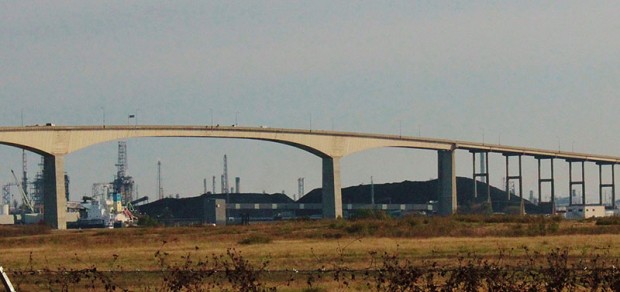Proposed Law Would Allow Houston To Regulate Mountains Of Coal

Photo by Dave Fehling.
Mountains of petroleum coke near the Beltway 8 bridge at the Houston Ship Channel.
State lawmakers are proposing legislation to deal with something we reported on this past December: giant piles of petroleum coke or “pet coke.” It’s a form of coal piling up along the Houston Ship Channel, and it’s leading to complaints from some nearby residents.
We recently reported how black mountains of petroleum coke could be seen along the Ship Channel; one pile looked to be more than half as high as the Beltway 8 bridge. The pile is just a mile from a neighborhood where we’d talked to Esmerelda Moreno who said with so many refineries and chemical plants nearby, they get used to mystery odors.
“Sometimes there’s like a smell, a weird smell,” Moreno said.
But could there be something else in the air, like dust from the piles of coke? The coke is a by-product of refining oil and is often exported to places like China where it’s used for fuel.
The terminal that handles the coke near the Beltway 8 Bridge is operated by Houston-based Kinder Morgan. The company said it has spent $200 million on equipment to suppress any dust from the piles or from conveyor belts that move the coke. But a local environmental group, Air Alliance Houston, tested the air in the nearby neighborhood.
“And we did find evidence of pet coke contamination at residences in that area,” said the group’s director, Adrian Shelley. He said there’s concern that not enough is being done to regulate the pet coke.
Now, two state lawmakers from Houston are proposing a new law. It would allow local authorities to take enforcement action to minimize the risk of dust to neighborhoods including restrictions on where the piles could be located and requiring them to be covered.
“So a law like this would provide express authority for local governments to enact legislation to limit pollution and protect its citizens,” said Shelley.
Shelley says a state law allowing explicit local regulation is needed because of on-going efforts by some state lawmakers to curb the power of local governments to enforce pollution laws.
Kinder-Morgan told us it wouldn’t comment on the proposed legislation, but had previously said that its dust control efforts were in compliance with current state laws.
